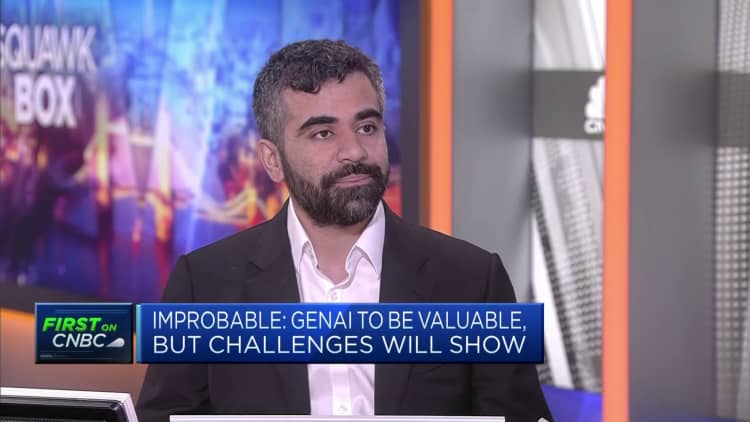[ad_1]
Herman Narula, co-founder and CEO of Improbable, speaks during a session at the Web Summit in Lisbon.
Henrique Casinhas | Sopa Images | Lightrocket | Getty Images
Metaverse company Improbable has sold one of its key gaming ventures to London-listed video game developer Keywords Studios for £76.5 million ($97.1 million).
The company closed the deal to sell The Multiplayer Group (MPG), a multiplayer game services firm, to Keywords on Sunday, an Improbable spokesperson told CNBC.
Based in Ireland, Keywords owns more than 70 studios in locations including Los Angeles, France, Brazil, Mexico and Spain. The firm mainly develops games for third-party developers.
Keywords’ shares have fallen around 49% year-to-date. It has been on an acquisition spree lately, earmarking 91.9 million euros ($100 million) to new takeovers.
That led to a shift from a net cash position at the end of last year to a net debt position of €11.4 million as of June 30.
Keywords also reported earnings per share of 18.48 euro cents in its half-year results for the period to June 30, down 40% year over year.
Keywords said its acquisition of MPG was funded primarily through cash and its existing revolving credit facility, and would contribute double-digit revenue growth in 2024.

Keywords expects the transaction to be earnings per share accretive in its first full year post-acquisition.
MPG was founded in 2018 and is known for behind-the-scenes work on games such as Fallout 76 and Medal of Honor: Above and Beyond.
Herman Narula, Improbable’s co-founder and CEO, told CNBC the transaction was part of its “venture builder” strategy, through which it invests in or acquires gaming and metaverse-related teams with the option of expanding or spinning them off at a later point.
“The thought was, if we understand multiplayer well, and we understand metaverses, maybe we can spot opportunities where we can bring things in the den that we can do well with. And then, at the right time, if it makes sense, to either keep growing them or potentially spin them out,” Narula told CNBC in an exclusive interview.
“It became clear that working with MPG and bringing them in house would have let us learn a colossal amount and help them grow.”

Improbable acquired MPG in 2019, and it has grown dramatically since. Employee numbers rose sixfold in the past four years to 360.
And MPG’s valuation has more than doubled to £76.5 million from Improbable’s original purchase price of £30 million.
While the move suggests a potential scaling back of Improbable’s gaming-related investments, Narula disputed the idea that a sale of MPG marks any sort of retrenchment from that space.
“We’re not in any way selling any technology, or in any way ceasing to operate with games companies,” Narula said. “MPG provide a very specific, specialised service.”
A series of games built on Improbable’s original SpatialOS technology have been canceled in recent years.
They include the open-world game Nostos, developed by NetEase, Worlds Adrift, made by Bossa Studios, and the console version of Scavengers, a game developed by Midwinter Entertainment.
Midwinter was sold by Improbable earlier this year to Behaviour Interactive.
Morpheus, a technology platform developed by Improbable, is now the company’s primary product. Morpheus is designed to host mass-scale multiplayer online games.
Improbable has hosted new experiences using its Morpheus tech, including virtual Major League Baseball games, and the “Otherside” metaverse developed in partnership with blockchain firm Yuga Labs.
Trying to sell investors on ‘metaverse’
Founded in 2012, Improbable is a British firm that aims to build what it calls a network of metaverses. In June, Improbable launched MSquared, a metaverse creation suite, and granted developers access to the platform.
MSquared includes its own network, tech stack, and open-source metaverse markup language.

The deal to sell MPG, one of Improbable’s many notable bets on gaming, arrives after a series of struggles at the firm.
Improbable has undergone substantial cost reductions.
The firm, which scored a $3.4 billion valuation in October 2022, laid off dozens of staffers late last year after raising substantial sums from SoftBank and Andreessen Horowitz.
But valuations of once buzzy metaverse and Web3-related startups have been knocked this year and last year by waning investor enthusiasm for the space.
Improbable has more recently touted itself as artificial intelligence-enabled, saying this has helped lower costs. The company slashed its losses by 85% in 2022 to £19 million.
‘Tale of two metaverses’
Improbable originally set out to build large-scale computer simulations that have applications in gaming and defense.
But its metaverse bets have now become its main focus.
Improbable sold its defense business to Noia Capital in September, marking an exit from a loss-making venture for the firm.
Narula says he expects to see a “tale of two metaverses” emerge next year. Centralized gaming experiences such as Roblox and Fortnite will be eschewed in favor of decentralized, “Web3” metaverses, Narula said.
Web3 refers to the idea of a more decentralized and open version of the web, outside the control of a handful of powerful tech companies like Amazon and Meta.
Blockchain is a key technology involved.
“Ultimately, they [Roblox and Fortnite] are games with different modes made by users and by brands. But people can’t build businesses that they have control over, or that can do commercial things that would be appropriate,” Narula said.
“The other branch of the metaverse, which is driven in some ways by Web3 and in other ways by companies like ours … is really about creating a network of sovereign metaverses.”
Analysts have expressed skepticism about the ability for Improbable to commercialize its technology, not least owing to the technical limitations and high costs involved.
“The jury is still out if they have a viable business model going forward, or whether the reality will ever match the ‘virtual’ hype,” Greg Martin, co-founder and managing director of Rainmaker Securities, a private market trading firm, told CNBC.
Narula said he is hoping to sign up many more partners for MSquared in the future.
Improbable, which is focusing on putting on large-scale metaverse events, ran 30 such gatherings in 2023, up from only three last year. The company plans to raise that number to 300 in 2024.
[ad_2]
Source link



